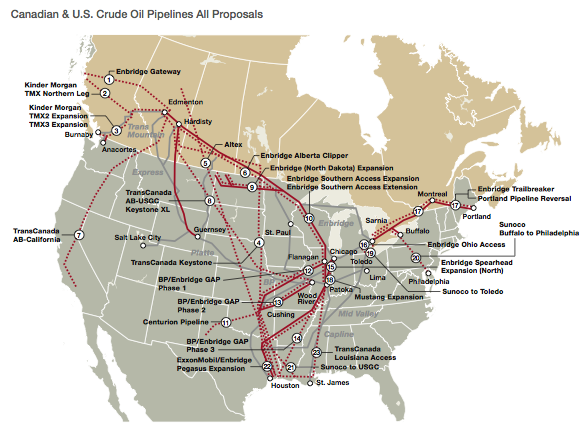Major Indigenous support for Enbridge Corporation’s Northern Gateway pipeline collapsed on Tuesday January 17, 2012, after the Gitxsan First Nation killed its agreement with Enbridge.
Enbridge quickly stated it was undeterred and would continue to court the Gitxsan First Nation and other First Nation communities whose territories would be affected by the $5.5-billion pipeline project, citing deals with more than 20 First Nation groups that have agreed to take an equity stake in the pipeline.
Media reports suggest the agreement collapsed in a 28-8 vote after those Gitxsan First Nation members opposed to the pipeline argued the money would not have a great enough impact on the Nation’s membership while also citing serious environmental risks to its territory.
In a statement from Gitxsan Chief Clifford Morgan on Wednesday, January 18, 2012, he said, “We stand together with all the other nations that are opposing [the Gateway project] … There would be too much destruction if an oil spill happened.”
One of the potential environmental threats flagged was to the Fraser River watershed or potential tanker spills off the coast of British Columbia.
Enbridge had been under intense scrutiny for pipeline ruptures, including the Norman Wells’ pipeline leak in the Northwest Territories, which leaked up to 1,500 barrels into the northern environment. Enbridge fell under scrutiny for that May 9, 2011 pipeline spill when it originally reported that only four barrels of oil had been spilled, and was later forced to revise that number.
Using data from Enbridge’s own reports, the Polaris Institute calculated that 804 spills occurred on Enbridge pipelines between 1999 and 2010. These spills released approximately 168,645 barrels (26,812.4 m3) of hydrocarbons into the environment .
In Enbridge’s promotional materials, Enbridge proactively admits that spills will happen and provides information on how to “manage” them.
This is a turn of course for the Gitxsan Nation that at one point declared its support for the Northern Gateway pipeline project back in December 2011, which could bring at least $7 million in net profit over 30 years to the impoverished Gitxsan communities located in northwest B.C.
Elmer Derrick, the hereditary chief of the Gitxsan Nation, published an editorial in the Vancouver Sun on December 8, 2011, stating, “The Gitxsan are positive people with a clear vision towards economic prosperity. We like to be creative in our thinking, and approach opportunities — such as the one presented by the Northern Gateway Pipelines project — with an open mind. We also wish to be self-sufficient, and we intend to do this through joint ventures in oil and gas, logging, ecotourism and run-of-river power projects.”
Backlash against the Gitxsan Nation was quick from within Gitxsan First Nation communities and other First Nations and environmental groups. Chief Marjorie McRae and Chief Norman Stephens said their nation was “in shock and embarrassed.”
Public hearings regarding the $5.5-billion project began on January 10, 2012, in Kitimat, B.C., and the consultation process is expected to take 18 months to complete. Click this link to find hearing locations in B.C.
On January 11, 2012, The Yinka Dene Alliance, a group of five First Nations who are leading opponents of the proposed Enbridge Northern Gateway Pipeline project, released a presser stating they were “outraged by statements by Prime Minister Harper and Natural Resources Minister Joe Oliver attacking opponents of the pipeline as foreign ‘radicals’ who are fighting against Canada’s national interest.”
“It is ludicrous for the federal minister to parrot tar sands lobbyists by directly attacking our communities that have decided the Enbridge project is too dangerous, and against our laws,” said Chief Larry Nooski of Nadleh Whut’en First Nation. “We’re not foreign — these are our lands. To imply that our decision against Enbridge has been manipulated is deeply disrespectful of First Nations people, and our many neighbours who have joined our cause and support our decision to refuse this pipeline.”
Opponents of the controversial Enbridge Northern Gateway pipeline project are currently blockading the Gitxsan First Nation treaty office in downtown Hazelton, B.C,. and have stated they will continue to do so until they receive written confirmation that the deal has indeed been struck down.
News of the First Nation refusal to co-operate with Enbridge Northern Gateway pipeline added to the jubilation among Indigenous and environmental activists who had just learned that the United States had turned down TransCanada Corp’s Keystone XL proposed project; another controversial pipeline project that puts Indigenous territories at risk of environmental damage.
The U.S. State Department announced on Wednesday, January 18, 2012, that President Obama had rejected TransCanada’s application for a permit to build the $7-billion cross-border pipeline on the grounds that the government did not have enough time to properly study it.
In both instances, these pipeline projects have hit roadblocks but both corporate backers have stated their intentions to keep moving forward while opponents to these pipelines indicate they will continue to fight.




